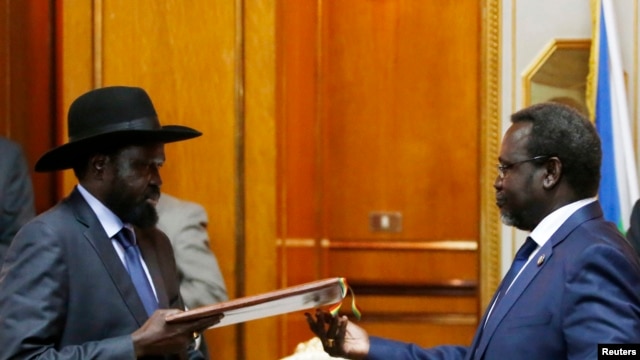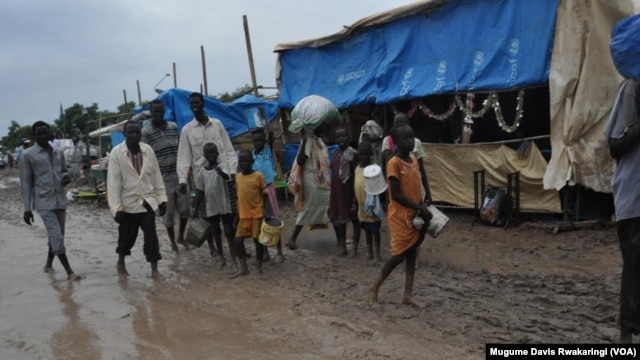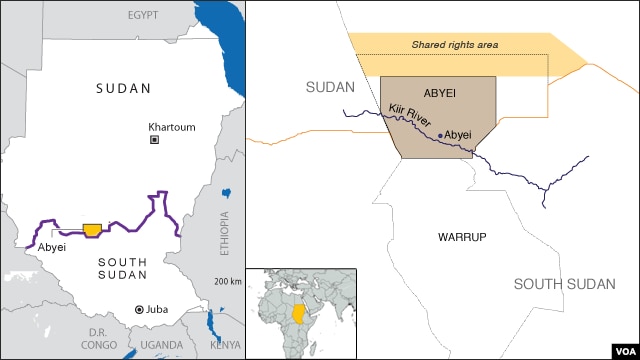South Sudanese President Salva Kiir on Saturdayandnbsp;trumpeted his government's unrelenting effortsandnbsp;to end the nine-month conflict inandnbsp;South Sudan and move the world's newest nation from fighting and violence to social and economic development.andnbsp;
President Salva Kiir's speech to the United Nations General Assembly
- Playlist
- http://av.voanews.com/clips/VEN/2014/09/27/3ebb5cab-ea7b-4ff3-ac1d-a68163ad520d.mp3?download=1Download
"I have no doubt the worldandnbsp;has followed with shock and disbeliefandnbsp;the violent conflict that erupted in South Sudan on the 15th of December,andnbsp;which was plotted by my former vice president,andnbsp;who wanted to seize power by force," Mr. Kiir said in hisandnbsp;http://webtv.un.org/watch/south-sudan-general-debate-69th-session/3809651665001speech to the 69th session of the United Nations General Assembly in New York.andnbsp;
Key Quotes from South Sudan President Salva Kiir's Speech to UN General Assembly
Wearing his trademark cowboy hat, Mr.andnbsp;Kiir thanked the international community and, in particular, regional blocandnbsp;the Intergovernmental Authority on Development (IGAD) for "their prompt action to restore peace andandnbsp;stabilityandnbsp;in my country," andandnbsp;pledged his government's "unwavering" commitment to end the fighting.andnbsp;
"My negotiationandnbsp;team has been in Addis Ababa in Ethiopia since Januaryandnbsp;2014, talking peace with the rebels to close this dark chapter in theandnbsp;history of our young country... andnbsp;to allow us to once again embark on the difficult mission of social and economic development," he said.
http://gdb.voanews.com/31C8C106-874D-4216-84F8-4DF775213302_mw1024_s_n.jpg

But he blamed the lack of progress in ending the fighting in South Sudan on the armed opposition, led by his former deputy, Riek Machar. Although the violence has died down in recent months, sporadic clashes still rock parts ofandnbsp;South Sudan, in spite of the signing of a cessation of hostilities agreement in January, which both sides have recommitted to twice since then.
"The rebels have violated the agreements too many times and have refused to sign the protocol... which forms the basis for resolving the crisis peacefully and inclusively," Mr. Kiir told the Generalandnbsp;Assembly.
He askedandnbsp;the international community to pressure the opposition into showing that it, too, is committed to ending the conflict in South Sudan, which has displaced around 1.8 million people, claimed at least 10,000 lives, and dragged the world's youngest nation to the edge of famine.andnbsp;
Working with UNMISS
Mr. Kiirandnbsp;said his government is working with the United Nations Mission in South Sudan (UNMISS),andnbsp;with communityandnbsp;leaders, civil society groups and faith-based organizations "to build trust with the internally displaced persons inandnbsp;UNMISS camps so that they return to their homes and restart, once again, their normal livelihoods."
Nearly 100,000 internallyandnbsp;displaced persons (IDPs) have sought shelter at U.N. compounds around South Sudan.
South Sudan's Justice Minister Paulino Waniwila Unango said at a meeting of the U.N. Human Rights Council this week that Mr. Kiir's government has made great progress in restoring security in Juba and convincing IDPs to leave the UNMISS camps and go home. But a spokesman for UNMISS, Joseph Contreras,andnbsp;disputed that claim.andnbsp;
http://gdb.voanews.com/1CFA3EEA-6AB6-4AE6-981B-7236D476A6F4_mw1024_s_n.jpg

Relations between the South Sudan government andandnbsp;UNMISS have been rocky, with President Kiir accusing the U.N. Mission in January, around a month into the conflict, of trying to take overandnbsp;the young country. He dialed back those accusations a few days later.andnbsp;
'Purely political power struggle'
In his U.N. speech, Mr. Kiirandnbsp;andnbsp;also insistedandnbsp;that the conflict in South Sudan is "purely a political struggle for power, not an ethnic conflict as it has been reported."
At a meeting of the U.N. Human Rights Council earlier this week, former Nigerian president Olusegun Obasanjo, who is leading an African Union team that is probing human rights abuses during the South Sudan conflict, said that although the unrest may have been triggered by a political row, it "quickly degenerated into an ethnic conflict."
Mr. Kiir briefly touched on the media laws he recently signed, but did not mention if they have had any impact on journalists' rights.
He spoke of relations with neighboring Sudan, from which South Sudan split in 2011 after one of Africa's longest and most deadly civil wars, and of the disputed territory of Abyei, which sits on the border between the two countries. Juba and Khartoum are working to find an "amicable" solution on the status of Abyei, Mr. Kiir said.
http://gdb.voanews.com/85131CEE-2C11-40AB-BD3C-8F94FE328956_mw1024_s_n.png

He called "positive measures" the ratification of threeandnbsp;international conventions -- against discrimination againstandnbsp;women, children'sandnbsp;rights, and a convention against torture -- by South Sudan;andnbsp;expressed solidarity with West African countries struck by the deadly Ebola virus, and warned the rest of the world that, "We must race against the clock to save humanity and the planet" from the ravages of climate change.
Mr. Kiir ended his speech with a "firm commitment to return South Sudan to peace" and a pledge to work with the international community and UNMISS to do so.
andnbsp;
andnbsp;